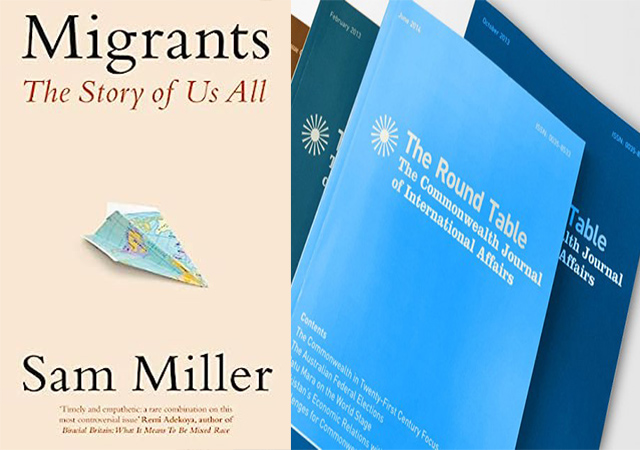
[This is an excerpt from an article in The Round Table: The Commonwealth Journal of International Affairs.]
In seeking to reset what has become a toxic debate about migration in many countries, Sam Miller, readily admits his latest book has been a hugely ambitious and daunting undertaking. His central argument is that humans are fundamentally migratory in ways that we often fail to recognise. He wants Migrants: The Story of Us All to be seen as an alternative history of the world, in which humans migrate for a wide range of reasons: not just because of civil war, or poverty or climate change but also out of curiosity and a sense of adventure.
Miller looks at migrants through the broadest of lenses with intriguingly titled chapter heads, anecdotes and unexpected devices designed to keep the reader hooked. He covers migration from pre-historic days, Biblical times and charts the layers of overlapping movements of population out of Africa, across the Middle East, Asia, Europe and the Americas. He reminds us of how little has changed over the last three thousand years, and how migration has always been, since the very beginning, central to the human story. And remains so. This broad and sweeping overview may not appeal to academics and historians, but as Miller makes clear his purpose is to tell human stories. Migrants does not fall neatly into any category since it encompasses elements of history, travelogue and autobiography.
According to Miller, migration has become a proxy for a whole range of issues that ‘impinge on our lives and our thinking: identity, ethnicity, religion, ideas of home, patriotism, nostalgia, integration, multiculturalism, safety, terrorism racism’. His thesis is that the role of migration in human history has often been underplayed, overlooked or misunderstood. He thinks the most important reason is a still-dominant narrative that sees the history of human beings as a primarily linear story of continuing progress in which savages are transformed into citizens, and nomads become householders. He challenges the premise that having a permanent home and a lifelong nationality are considered normal, as if they were part of the human condition. He believes that in many ways the opposite is true and thinks a wider recognition of this might encourage us to rebalance our view of the ‘normal’ world.
Weaving the historical and the personal, Miller divulges what could have been a traumatic discovery about his own paternity. Miller writes: ‘It is not essential to have been a migrant to see human history through this alternative lens, but it may help. I have been away from the country of my birth, the UK, for most of my adult years, for a range of reasons: as a spouse living in India, my wife’s country; in order to work for the BBC, and to write books – and quite simply – because I wanted to. And so, over the last 10 years, while this project has been in gestation, I have lived (for at least 3 months, and sometimes a lot longer) in India, Tanzania, Nigeria, Tunisia, Afghanistan, Cambodia, Ethiopia, and Indonesia – with several short spells back in the UK, usually in the London house in which I was born. And I am, for now, comfortable in not having a place I call home’. Miller is honest in acknowledging that, in comparison to most migrants, he has had it easy. His passport, job, background, colour, and gender all combine to make it uncomplicated for him to live almost anywhere he wants, for long or short periods, in ways that most migrants never experience. This means that he is not a stereotypical migrant.
Miller asserts that the language surrounding migration is often loaded and confusing. Many definitions of the word ‘migrant’ are narrow in scope and designed only to deal with immigration in modern times often referring to nations or borders or citizenship. Miller maintains that in practice the word ‘migrant’ clumps people whose experience of migration is extremely diverse – slaves and spouses, refugees and retirees, nomads and expats, conquerors and job-seekers. He explores how in France and Britain post-war migration became entangled with the slow bloody collapse of both countries’ empires and notes how migration affected the transition from British Empire to the Commonwealth with a section devoted to the travails of the Windrush generation who came to Britain from the Caribbean.
Rita Payne is a member of the Round Table editorial board.
Migrants: The story of us all by Sam Miller, London, Abacus Books, 2023.



